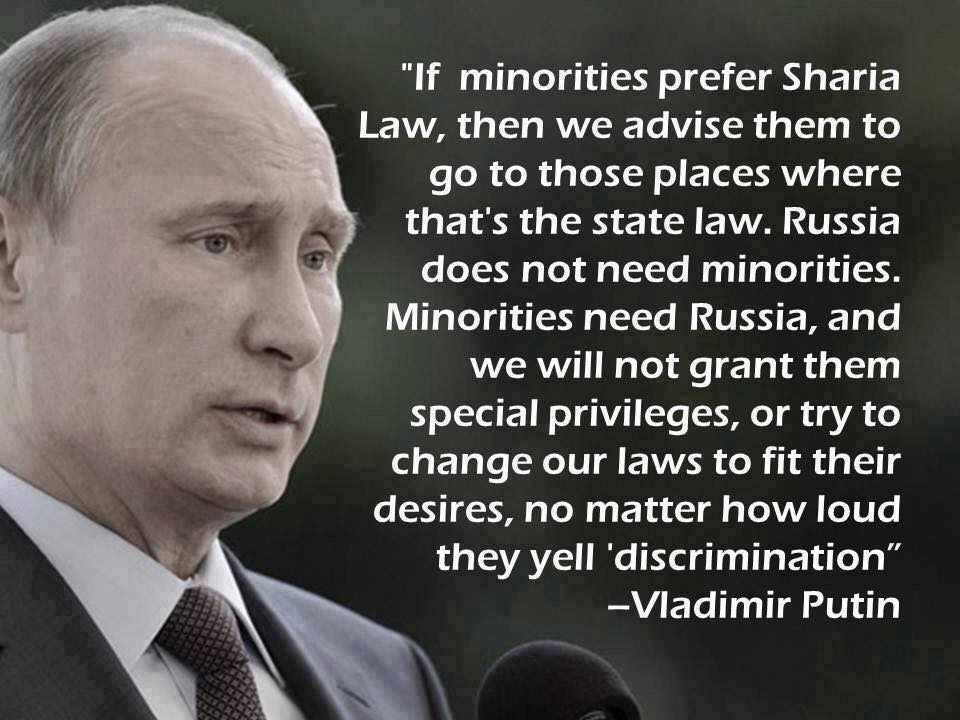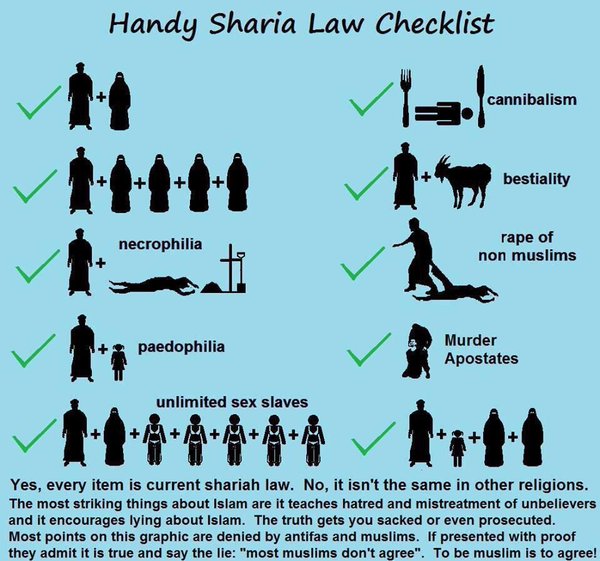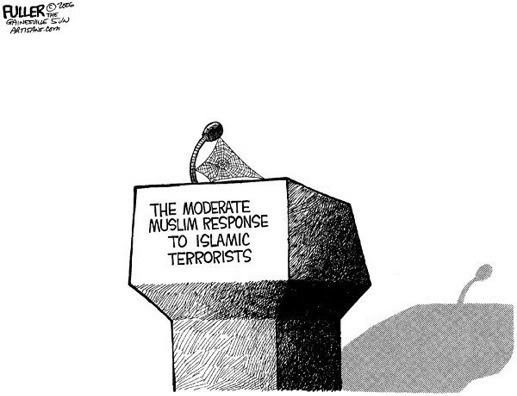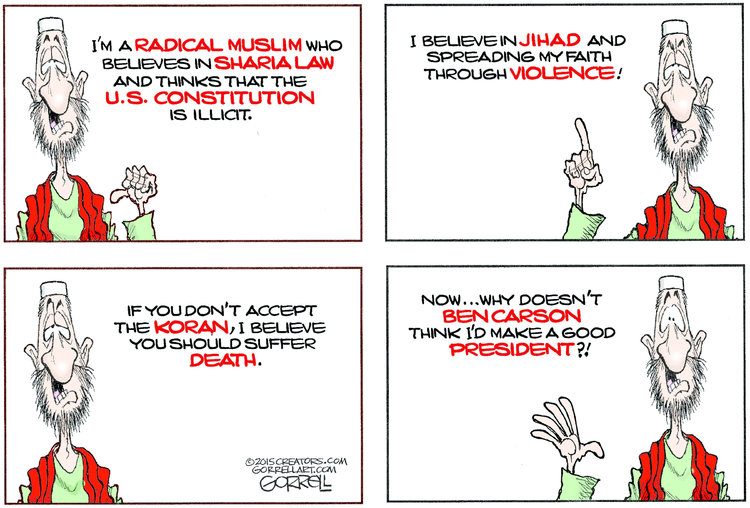Tag: Sharia Law
Peaceful Muslims – The Vast Majority Myth
Is it true that the vast majority of Muslims are peaceful? What if it’s false?
We often hear it said that the vast majority of Muslims are peaceful and reject violence. That proposition is worth examining because if it’s not true there is cause to worry. Of course, you should be worried already. Even if only a small percentage of the world’s 1.6 billion Muslims are prepared to use violence, that still works out to a large number. However, if the vast-majority thesis doesn’t hold up, you might want to order a Kevlar vest from Amazon, or, if you’re the accommodating type, you could start practicing the Shahada—the Islamic declaration of faith.
There is a good deal of polling data to suggest that the vast majority of Muslims are not just your standard-issue vast majority. For example, Pew polls of public opinion in Pakistan and Egypt show that the vast majority (about 82 percent) favor stoning for adultery, amputation for theft, and death for apostates. So, even if a majority in these countries are not personally inclined to violence, they have no problem with the violent application of sharia law.
But rather than rely on polling data, let’s look at some other ways of assessing the “vast majority” proposition. For some perspective, here are some other “vast majority” propositions that just popped into my head:
Proposition 1. The vast majority of people are peaceful until they’re not.
Proposition 2. The vast majority of people go with the flow.
Proposition 3. The majority of people in any society are women and children.
With the exception of the third proposition, there is no empirical evidence for these propositions, but they seem just as reasonable as the proposition that the vast majority of Muslims are peaceful—a supposition which also has no empirical support. However, Proposition 3 does lend credence to the “vast majority of Muslims” thesis since women and children are, for various reasons, less inclined to violence than adult males. It would therefore be reasonable to say of any society that at least a majority are peaceful.
But people who are peaceful today will not necessarily be peaceful tomorrow. It’s probably safe to say that the vast majority of Hutus were behaving peacefully before the Rwanda genocide of 1994 … and then they stopped behaving peacefully. Using clubs, machetes, and, occasionally, guns, the Hutu managed to kill about 800,000 Tutsi in the space of one hundred days. It’s likely that the vast majority did not take part in the killings, but, by all accounts, a sizeable number did, and an even greater number were complicit. According to reports, most of the Tutsi victims who lived in rural villages were murdered by their neighbors.
So, in line with Proposition 1, the majority of the Hutu were peaceful until they were not. And, in line with Proposition 2, the majority of the Hutu went with the flow—the flow, in this case, being in the direction of mayhem. It should be noted, however, that there were powerful incentives to go with the flow. Moderate Hutus who declined to join in the killing were often killed by their fellow Hutus as a warning to others.
Although women took part in the slaughter, Proposition 3 would suggest that the majority of them did not. And if you combine the women with the children, the elderly, and the moderates, it is reasonable to assume that the majority of Hutu did not participate in the carnage. That, however, would have been small comfort to the Tutsi. The more you think about it, the less comforting it is to know that the vast majority of any population won’t take up arms against you.
History is full of examples of peoples and nations who were peaceful and then were not. Prior to World War I, the vast majority of Europeans were behaving peacefully. Then came 1914, and the European nations went to war with each other. The majority, of course, remained at home and were never involved in battle, but it seems safe to say that most of them fully backed their own side in the conflict and welcomed news of enemy casualties.
Given the right circumstances, the majority of almost any population will willingly put itself on a war footing and turn their homeland into a home front. The questions is, is there something about Islamic cultures that make them more susceptible to warlike attitudes more of the time?
Before attempting an answer, let’s briefly consider another historical example—the Spartans. Were the vast majority of Spartans peaceful? In the sense that the great majority, including women, children, and the elderly were not at war all the time, yes. Still, we would be mistaken to call them a peaceful people. Sparta was a warrior culture, and it cultivated a warrior mentality in its citizens.
The Spartans were a unique case, but in so far as Islam has a tendency, it tends in the direction of Sparta rather than, say, in the direction of Sweden—a land which was once host to a warrior culture of its own. But the Vikings are long gone, and their peaceful descendants look like they will be the first European nation to fall to Islam—a culture which has been more or less at war with the rest of the world since its inception.
Why is the sharia penalty for apostasy death? Because Islam understands itself to be an army. And the penalty for deserting an army in wartime is death. But for Islam, all times are wartimes. The basic division in the Islamic faith is between the House of Islam and the House of War. The essential mission given to Muslims is to bring the House of War (all non-Islamic nations) under the control of the House of Islam.
Like the Spartans, the first Muslims were warriors. Their leader was both a prophet and a warlord. Since Muslims are still expected to model their behavior on Muhammad, it’s not surprising that Muslim cultures will be more prone to violence than, say, cultures that take Jesus or Buddha as their inspiration. Our own culture is completely sold on the importance of having role models to emulate, but hasn’t yet grasped the consequences that follow when 1.6 billion people take Muhammad as their primary role model. Indeed, one of the chief appeals of ISIS and company is their promise to return Islam to those glorious days when Muhammad spread the faith by force.
It may well be that a great many Muslims today just want to be left alone to go about their business. But one of the built-in features of Islam is that, if you’re a Muslim, it won’t leave you alone. It wants to force you to be good. However, the only way to know if you’re good is if you conform to sharia. Thus, where Islam is practiced in its purest form, the virtue police patrol the streets, and everyone understands that if they convert to another religion they can be executed for apostasy—that is to say, desertion.
[AdSense-C]
Moderate Muslims
There is no such thing as a Moderate Muslim.
Spread this everywhere!
The HARD TRUTH About ‘Moderate Muslims’ From a Moderate Muslim:
In my childhood I was told that every day that passes on the Islamic nation without a caliphate is a sin. That the failures and miseries of the Muslim world started the moment we gave up conquests and wars against the infidels. That our prosperity depends on conquering new lands, converting new believers, looting new resources and enslaving more women. I was taught that a Jew is essentially a demon in flesh and that it is our destiny as good Muslims to kill them all. I was regularly fueled by battle stories and stories of lethal feuds of seventh century Arabia. It was not just me, a small child in Cairo, who was raised with these great apocalyptic prophecies, it was also so many people from all around the globe.
The bottom line is; it is quite possible, at one point of history, to have an entire nation dominated by some very bad ideas. We have seen it before and we are seeing it today. For the west now to deny this historical fact and pretend that the majority of people are always naturally sane, rational, peace loving hippies is hypocritical, misleading and dishonest. It is an ugly lie that offends our intelligence. We have a long history of the major human consensus to persecute women, Jews, Gypsies and homosexuals. Thus, it is quite possible — at least theoretically — for a significant portion or even the majority of the world’s Muslim population (estimated to be over 1.5 billion) to be anti-Semitic, homophobic and in sympathy with violence and even Islamic totalitarianism.
Many parts of the Muslim world are intolerant towards free speech, criticism and reform. Human rights are not observed in most of the Muslim world; women’s rights, homosexual rights, minority rights, freedom of speech, freedom of expression, freedom of belief..etc. are things that the majority of non-violent Muslims do not observe. Execution of apostates, women who are not allowed to drive, sexual segregation, persecution of liberals and journalists, homosexual imprisonment, and persecution of non-Muslim minorities are all common themes almost in all Muslim countries. Many Muslim countries use public beheadings, hangings, lashings, stonings and chopping of limbs as an accepted form of punishment.
My argument is, we are using the label “moderate” for everyone who is not trying to kill us regardless of that person’s actual views. We are in a very bad situation to the extent that we have confused moderation with self-interest. The majority of the Muslim world may not be moderate, but rather acting in its daily life from a purely self-interested point of view. This is a very good thing. We should encourage all Muslims to act and preserve their self-interests. But we should not lie to them about the nature of their religious ideas.
If we are sincere about solving this pressing global issue, then we should be honest and truthful. We can’t fight cruel terrorists while we ally ourselves with people who commit similar atrocities but have more oil. We can’t allow ourselves to deceive our Muslim friends that it is their right to oppose free speech, LGBT rights, women’s rights etc. Moderate Muslims should not be part of the problem, they should be the solution. Islamic extremism will not be “degraded and ultimately destroyed” unless it is Muslims themselves who fight it. Being obsessed with religion is not a proper response and we should be honest and clear about that. I am aware of the fact that all I’m sharing is tough and not easy to do, but I can assure you that closing our eyes to reality will do us no good. Only acknowledging it will allow us to take our first steps toward a profound and desperately needed reform.




